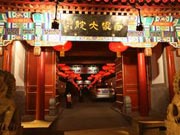


Zhou Xiaochuan, governor of the People's Bank of China, answers questions at a press conference for the third session of the 12th National People's Congress (NPC) on financial reform in Beijing, capital of China, March 12, 2015. (Xinhua/Cai Yang)
BEIJING, March 12 -- Speculative capital flows do exist in China but a "vast majority" of the country's cross-border capital flows are associated with normal trade and investment activities, central bank governor Zhou Xiaochuan said Thursday.
Zhou, governor of the People's Bank of China (PBOC), made the remarks at a press conference on the sidelines of the ongoing annual session of the National People's Congress, the top legislature.
It is difficult to accurately observe the amount of "hot money," or speculative capital flowing in and out of the country, but "it does exist," Zhou said.
He admitted there are capital outflows due to a lack of confidence in the economy but the number is not very large compared with the volume of normal trade and investment.
Also in response to concerns of hot money, Yi Gang, vice governor of the PBOC, said capital flows are a result of multiple factors including trade, investment and people traveling across the border.
Domestic enterprises, individuals and financial institutions now tend to adjust their investment portfolios based on expectations, Yi said, noting it is reasonable and normal that they are more willing to hold foreign currencies such as the U.S. dollar under certain circumstances.
According to Yi, total U.S. dollar deposits held by domestic enterprises and individuals increased by more than 100 billion in 2014.
"But we are also on alert of some abnormal capital flows," Yi added.
China's capital account deficit widened sharply in the last quarter of 2014 to 91.2 billion U.S. dollars, compared with the third quarter's 9 billion dollars. The widening deficit fanned concerns of massive capital outflows from the country as economic growth slowed.
The currency also witnessed continued depreciation against the dollar in late January and early February, partly caused by quantitative easing by the European Central Bank and successive interest rate cuts in countries such as Australia, Denmark and Canada, according to experts.
Taking a question on a strong U.S. dollar and possible interest rate spike in the United States, Zhou Xiaochuan said it is "not a big threat based on current observations."
Noting that the Federal Reserve has always been "prudent" and "patient" on such decisions, Zhou said a U.S. interest rate increase, if materialized, could also be taken as a sign of a substantial recovery of the U.S. economy and a positive signal to the world economy.
Day|Week

 Tsinghua junior makes over 10,000 yuan a day by selling alumnae's used quilts
Tsinghua junior makes over 10,000 yuan a day by selling alumnae's used quilts Graduation photos of students from Zhongnan University
Graduation photos of students from Zhongnan University A school with only one teacher in deep mountains
A school with only one teacher in deep mountains Glimpse of cultural heritage "Xilankapu"
Glimpse of cultural heritage "Xilankapu" Homemade cured hams in SW China
Homemade cured hams in SW China Breathtaking buildings of W. Sichuan Plateau
Breathtaking buildings of W. Sichuan Plateau Graduation photos of "legal beauties"
Graduation photos of "legal beauties" Top 10 most expensive restaurants in Beijing in 2015
Top 10 most expensive restaurants in Beijing in 2015